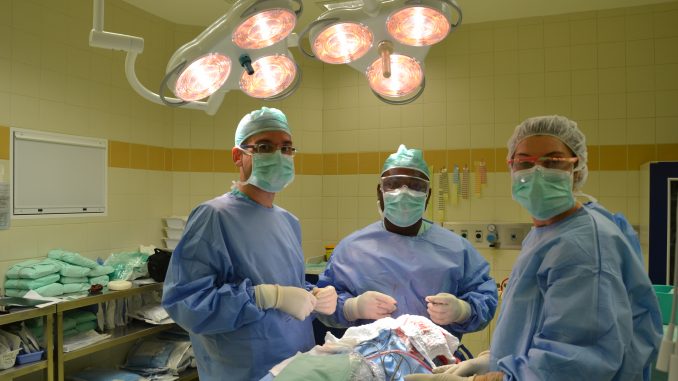
Dr. Fernando Ramirez de Noriega worked one year in Africa as a neurosurgeon. He kindly agreed to share some of his experience with the ISCAS community.
I arrived to La Paz hospital in Malabo, to Equatorial Guinea on August 2014 work with the local neurosurgeon and upgrade the Neurosurgical Unit. The hospital was built and is managed by an Israeli team supported by local government funding. Upon my arrival a budget was assigned for purchasing new neurosurgical equipment to better manage the neurosurgical pathologies that are common to the country, including head trauma, degenerative spine disease, congenital neural tube defects, hydrocephalus and infectious disease.
The main objective was to make this unit the referral center for the area. The hospital had three well-equipped general operating rooms. There was a brand new craniotome. The intensive care unit had multimodal monitors on which intracranial pressure could be continuously monitored. The emergency department had a one bed fully equipped trauma unit and a CT scanner was available 24 hours a day. However, there was no surgical microscope and no skull clamp system. No navigation system was available and the only MRI scanner was in another city called Mongomo, 50 minutes away by flight.
During the first couple of weeks I was able to gather information of the main pathologies of the area and make a complete inventory of the neurosurgical instruments and supplies. Orders were made to buy antibiotics, impregnated ventriculostomies, duramater substitutes, hardware for spinal arthrodesis, haemostatic agents, ventriculo peritoneal shunts, and for a second stage a skull clamp system and a surgical microscope. As a result, almost all of the frequent pathologies could be treated.
Working together with other Israeli doctors, nurses, technicians and administrative staff was very similar to the years I spent in Jerusalem, where I was trained in Neurosurgery and Functional Neurosurgery (Hadassah Hebrew University). I share the same official language with the local staff and patients, Equatorial Guinea was a Spanish colony until the late 60s; knowing both Hebrew and Spanish made things easy.
The collaboration with the local neurosurgeon was very fruitful and we learned a lot from each other. We performed a large variety of operations including spinal surgery for trauma, degenerative disease of the cervical, dorsal and lumbo sacral spine, and head trauma surgery, among many others. We applied the Brain Trauma Foundation Guidelines in the intensive care unit and followed international guidelines in our decision making process. Second opinions on challenging cases from senior doctors in Israel were available to us as well. There were only a few cases that we were not able to handle due to the lack of surgical microscope: skull base surgery and vascular surgery. In these cases the patients were transferred abroad. There were also too few patients with brain space occupying lesions and therefore the investment into a navigation system in the end was not made, and almost no Parkinson’s disease patients to invest on a Functional Neurosurgery program.
The case that affected me the most was a young patient, who after a penetrating brain injury, underwent a decompressive hemicraniectomy (a neurosurgical procedure in which part of the skull is removed to give a swelling brain room to expand). He developed what initially we thought were post traumatic seizures, which did not respond to anticonvulsive treatment. After a while, the patient developed the classic signs of tetanus, changing our diagnosis to generalized tetanus. The patient was successfully managed in the intensive care unit. Due to vaccination, Tetanus is almost not seen in developed countries. It was the first time for me dealing with this disease, and the diagnosis was made early by my colleague who had seen some cases in the past.
During this year, we were able to establish treatment protocols for most of the neurosurgical pathologies treated in the hospital, and worked together with the operating room nurses and the CEO, constant replacement of the used supplies was warranted. For me it was a totally new experience, not only being able to work as a neurosurgeon, but also to learn about health management and exchange knowledge with a local neurosurgeon who is now working there by himself.
In the research field, there is an opportunity in the head trauma area due to the volume of patients and the possibility to warrant all tier therapies. Development of a more economical navigating system would be also of interest to improve the accuracy of different surgical procedures.
Today, Dr. Fernando Ramirez de Noriega is back at his hometown in Lima, Peru where he works as a neurosurgeon.

This is a beautiful article about a unique experience that shows an unusual collaboration.
Bravo!
May name is Dr Mohamed Abdirahman We need to partcipate all funtion aout Neurosutgeon